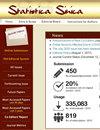同时功能分位数回归
IF 1.2
3区 数学
Q2 STATISTICS & PROBABILITY
引用次数: 0
摘要
功能分位数回归(FQR)的传统方法是对每个感兴趣的分位数分别拟合回归模型。因此,回归的斜率函数作为时间和分位数的二元函数,被估计为每个固定分位数的单变量时间函数。然而,这种传统策略有几个限制。例如,它不能保证条件分位数的单调性,也不能控制斜率估计器作为二元函数的平滑性。本文提出了一种新的FQR框架,在一定的约束条件下,利用二元基同时拟合多个分位数的FQR模型,使估计的分位数满足单调性条件,并控制斜率估计量的平滑性。证明了所提出的斜率函数的估计量是渐近一致的,并建立了其渐近正态性。通过仿真对该方法的有限样本性能进行了评价,并与传统方法进行了比较。我们通过分析中国统计:预印本doi:10.5705/ss.202021.0248的效果来证明所提出的方法本文章由计算机程序翻译,如有差异,请以英文原文为准。
Simultaneous Functional Quantile Regression
The conventional method for functional quantile regression (FQR) is to fit the regression model for each quantile of interest separately. Therefore, the slope function of the regression, as a bivariate function of time and quantile, is estimated as a univariate function of time for each fixed quantile. However, there are several limitations to this conventional strategy. For example, it cannot guarantee the monotonicity of the conditional quantiles, nor can it control the smoothness of the slope estimator as a bivariate function. In this paper, we propose a new framework for FQR, in which we simultaneously fit the FQR model for multiple quantiles, with the help of a bivariate basis under some constraints, such that the estimated quantiles satisfy the monotonicity conditions and the smoothness of the slope estimator is controlled. The proposed estimator for the slope function is shown to be asymptotically consistent, and we establish its asymptotic normality. We use simulation to evaluate the finite-sample performance of the proposed method and compare it with that of the conventional method. We demonstrate the proposed method by analyzing the effects of Statistica Sinica: Preprint doi:10.5705/ss.202021.0248
求助全文
通过发布文献求助,成功后即可免费获取论文全文。
去求助
来源期刊

Statistica Sinica
数学-统计学与概率论
CiteScore
2.10
自引率
0.00%
发文量
82
审稿时长
10.5 months
期刊介绍:
Statistica Sinica aims to meet the needs of statisticians in a rapidly changing world. It provides a forum for the publication of innovative work of high quality in all areas of statistics, including theory, methodology and applications. The journal encourages the development and principled use of statistical methodology that is relevant for society, science and technology.
 求助内容:
求助内容: 应助结果提醒方式:
应助结果提醒方式:


